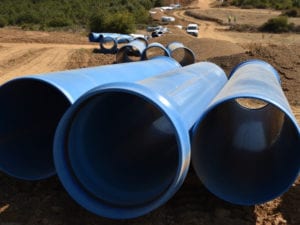The Southern African Plastic Pipe Manufacturers Association (SAPPMA) has recently announced the forming of three new standing committees within the organisation.
Each of these committees has a specific area of focus that relates to the plastic pipe industry and is headed up by leaders who have many years of first-hand experience of the issues being faced on a daily basis.
“SAPPMA is privileged to count individuals who are world-class experts in their respective fields among our members. It, therefore, made sense for us to give these professionals the freedom and authority to head up specialist working committees that focus specifically on issues that directly impact the manufacturing and use of HDPE pipes, PVC pipes, and the installation and fabrication of these pipes. Through forming these new SAPPMA standing committees, we are able to better handle specific technical matters (such as standards, testing, application, etc.) and to arrive at sound practical resolutions based on research, knowledge, and discussion. The underlying principle is making progress in terms of the understanding, application, and monitoring of standards, while at the same time ensuring resolutions remain practical, understandable, and economical,” explains Jan Venter, Chief Executive Officer of SAPPMA.
Small teams of experienced individuals make up the standing committees who meet in their own time and aim to arrive at resolutions within a reasonable time period.
Apart from being in regular contact and consulting with the SAPPMA management, they are expected to report back on their activities at the combined quarterly member meetings where their resolutions are heard before they become part of SAPPMA’s standards, rules, and policies.
George Diliyannis, Technical Service Leader at Safripol (Pty) Ltd, is responsible for heading up the HDPE committee, supported by Lesley Geyser, QC Manager and Production Planner at The Rare Group. Current areas of focus for this working group include addressing issues relating to the mixing and contamination of polyethylene, updating SAPPMA’s MFR document, and addressing queries that relate to specific standards, i.e. SANS 21138 and ISO 4427:2019.
Renier Snyman, Technical Manager at Sun Ace SA, chairs the PVC committee with the support of Tanya van Rensburg, Production Co-Ordinator of Eurocelt. Issues that are currently being addressed by this working group include the SANS 967 (strap-on saddles), SANS 966-2 (HSIT alternatives), SANS 1601 (sockets and seals), and queries regarding pipe lengths.
- IFPA (Installation and Fabrication Plastics Pipe Association)
Renier Pieterse, Director at Barona Pipelines and Fittings is responsible for heading up the IFPA committee that is currently working on a consultant’s document and training manual which will be made available to end-users and consulting engineers to enable them to call for the correct standards in tenders. They have also recently decided to remove the IFPA welder number from the welder certificates issued by Plastics SA and to add a reference field for a weld qualification attachment (i.e. welder test piece certificate) instead.
SAPPMA will be forming more standing committees in the future, depending on the need and with the mandate to look at specific issues beyond the current focus and scope, such as certification, for example.
Because the issues they address go beyond the scope of only their members, the pipe’s body is inviting end-users and specifiers to also become involved in these working groups.
“The new structure allows us to spend less time in discussions but also creates an opportunity for a more homogenous and harmonised decision-making. SAPPMA is hugely grateful to the individuals who are heading up the committees and the rest of their task teams for freely volunteering their time and energy, in addition to their own workloads. We welcome every member’s active participation, as they help to influence decisions that not only have a direct impact on our industry as a whole, but also individual businesses. Together we are united in our passion for improving the industry through implementing best practices,” Venter concluded.







